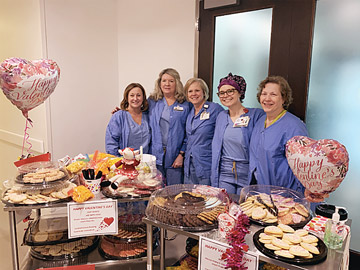Practicing daily gratitude is proven to have significant health and psychological benefits, including improving quality of sleep, lowering depression levels, blood pressure and stress cortisol levels and diminishing feelings of hopelessness. Gratitude can take shape in many different ways — a smile, a thank you, a get-well card. It's the small acts of goodness that really make a difference.
Meghan Glanc, MSN, RN, CNOR, nurse manager at the Cleveland Clinic Foundation, began researching the benefits of daily gratitude when traditional methods for improving her team's morale kept failing. After taking a leadership course that mentioned using gratitude as a means for personal growth, Ms. Glanc decided to pursue this approach with her staff. She first created a gratitude committee as an informal way to engage her team. "I said this is voluntary," she explains. "There are no expectations. There's really no agenda. We're just going to meet and build the committee together."
What does gratitude mean exactly? It is different for everyone. Denise Slovan, administrative assistant at the Cleveland Clinic and member of the gratitude committee, defined it as "an appreciation for every moment that is good. Because even though it could be a bad day, you can still find gratitude in some way."
After emailing every staff member about her new idea, Ms. Glanc had participants take baseline happiness and stress level quizzes. "Honestly, my score was very low," she says. "I needed to do some work on myself, but I also wanted to identify staff members who were in a bad place, and those who were in a good place, so we could work together and brainstorm about how to improve our lives."
Ms. Glanc scheduled standing gratitude meetings during lunch breaks and created a calendar of daily gratitude activities to guide the committee's meetings. Each participant was given a gratitude journal in which they could jot down their feelings during the day. During meetings, people were encouraged to share tidbits from their gratitude journals. Ms. Glanc shared that she loves Diet Coke. "One day, somebody left a two-liter bottle on my desk. I was floored, and so excited."
Ms. Glanc's gratitude calendar included actions like smiling more often, not complaining all day, not gossiping, focusing on your strengths and making a gratitude collage. While these activities were practiced by participants of the gratitude committee, the benefits reached other staff members and departments. "For Valentine's Day, committee members individually wrapped cookies and delivered them to departments throughout the entire hospital," says Ms. Glanc. "We even went down to the doctors' administrative offices and they said, 'Thank you, everybody forgets about us.'"
During the process, Ms. Glanc and the committee members learned that it's the small things that can change somebody's day and refuel their tank for the week. And while gratitude practices can improve the workplace environment, the benefits can extend to patient care as well. One activity involves gratitude committee members walking around the surgical department to meet with patients and their families. They achieved a renewed sense of purpose and learned a gesture as small as giving a cookie to a patient's family member can mean the difference between a good and bad day for them.
.svg?sfvrsn=be606e78_3)

.svg?sfvrsn=56b2f850_5)